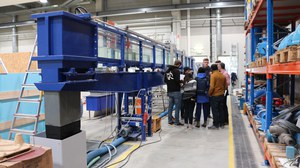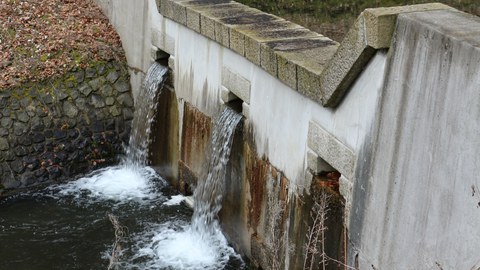Studying at the Institute of Hydraulic Engineering and Technical Hydromechanics
The Institute of Hydraulic Engineering and Technical Hydromechanics offers a wide range of courses for six degree programmes in German and one in English.
As a graduate of TU Dresden in the field of hydraulic and environmental engineering, you will be able to work in a wide range of activities with demanding job profiles. These include the dimensioning of structures in engineering offices as well as the implementation of projects either in building companies or on the client's side at state authorities, ministries or in Federal Waterways and Shipping Administration.
Studying the specialisation “Hydraulic and environmental engineering”
Water is the basis of all life. The availability of water in sufficient quantity and quality is the essential prerequisite for a variety of uses and the basis of all economic activity. The development of settlements, agriculture, industry and transport routes requires construction activities in and around water bodies for the purpose of drinking water supply, storage, energy generation, use for traffic, flood protection, water transport and many other things. Due to an increasing population density and the global climate change, the sustainable management of the resource water becomes even more important than ever before. Hydroelectric power plants supply environmentally-friendly, peak-demand electricity; seaport cities with modern trimodal logistic hubs are the most prosperous business locations; waterways are highly efficient and at the same time the most ecologically sustainable transport routes; dams are controlled multifunctionally; flood management systems in coastal and inland areas protect vulnerable areas according to the risk situation; fishing demands high standards of water quality and structure; agriculture depends directly on water being available; last but not least, leisure activities take place in and around the water. In addition to these anthropogenic uses, water landscapes are the lifelines of our planet and the habitat of many terrestrial and aquatic organisms. This is proven by the high biodiversity of flora and fauna in biospheres close to the water. Therefore, building in and around water means building in the environment.
Successful hydraulic engineering requires the consideration and coordination of these diverse uses. The hydraulic engineering expert has to face interdisciplinary demands. Extensive hydraulic, morphological, hydrological and hydrotechnical plant-specific knowledge and skills are just as relevant to the development of technical and near-natural solutions as the ability to assess and integrate nature conservation aspects early on in the planning phase. It is the prerequisite for passing the environmental impact assessment. Hydraulic engineering takes place on land and soil and has a close interrelation with geotechnics. Surface waters have their underground counterpart in groundwater, the pressure and flow of which can have an influence on the stability of hydraulic structures. Methodical competences in hydronumerical simulation enable the assessment of complex, unsteady flow situations. Experience in hydraulic engineering testing provides a sustainable understanding of process-relevant flow and transport processes. Basic competences in the planning approval procedure are a prerequisite for a building permit to be granted by the authorities.
Therefore, the specialisation Hydraulic Engineering and Environment offers three main focuses:
-
Design of hydraulic engineering structures,
-
Environmental hydraulic engineering,
-
Geotechnology in hydraulic engineering.
Hydraulic engineering includes the following areas of civil engineering:
-
Dam construction, operation and rehabilitation
-
Port construction (inland and sea ports)
-
River engineering and flood protection
-
Natural watercourse engineering
-
Marine construction and coastal management
-
Sewer construction
-
Hydroelectric power plant construction, pipeline construction
-
Agricultural hydraulic engineering
Graduates will be able to work in the following areas:
At engineering offices in Germany and abroad
-
Design, planning
-
Construction supervision
-
Construction management
At construction companies in Germany and abroad
-
Construction management
-
Calculation
-
Preparation and scheduling
At authorities and municipalities
-
Ministries (Ministry of Building and Environment)
-
Federal Waterways and Shipping Administration
-
Research institutions, universities
-
Dam management
-
Regional authorities, environmental agencies
-
Port authorities
-
Urban civil engineering
At utility companies and special purpose associations
-
Water and Wastewater associations
-
Water and soil associations
-
Hydromelioration associations
-
Agricultural operations





